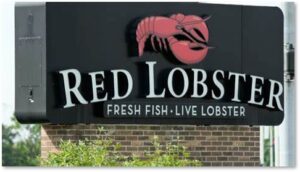 The Red Lobster chain of seafood restaurants has declared bankruptcy, which is a blow to many people. Here in New England, it didn’t cause a ripple because the restaurant chain couldn’t compete with the independent seafood restaurants and lobster shacks so prevalent here.
The Red Lobster chain of seafood restaurants has declared bankruptcy, which is a blow to many people. Here in New England, it didn’t cause a ripple because the restaurant chain couldn’t compete with the independent seafood restaurants and lobster shacks so prevalent here.
We only had a few Red Lobsters in New England but for many people elsewhere it was the place to go for seafood. Now the doors have closed, and those folks will have nowhere to turn. I only ate at a Red Lobster twice. For those of us blessed with plentiful fresh seafood, I found the casual-restaurant food just adequate. But I did love those Cheddar Bay Biscuits.
At fault is simple greed—just the kind you think of when it comes to food. Although that contributed to tanking Red Lobster.
Endless Shrimp at Red Lobster
 The chain used to offer all-you-can-eat shrimp periodically, as a special. That worked well but then they decided to add it to the regular menu. They got a predictable response from patrons who almost literally ate them out of business.
The chain used to offer all-you-can-eat shrimp periodically, as a special. That worked well but then they decided to add it to the regular menu. They got a predictable response from patrons who almost literally ate them out of business.
Its bankruptcy filing shows the company lost $11 million with their endless shrimp promotion. But that’s only 0.,55% of their $2 billion valuation. The May 19 bankruptcy closed almost 100 locations across the country and put 36,000 workers out of business.
Getting Their Money’s Worth
When we first lived in Sudbury, MA, it had an all-you-can-eat buffet restaurant packed with high-value items like steak, shrimp, and lobster. Right next door stood a Dairy Queen soft-serve ice-cream shop. We occasionally took our little kids there for a treat and, while we ate our ice cream, we could hear patrons of the buffet place talking while they waited in line to be admitted.
We overheard people, many of them very large, stating how they had not eaten all day, or all weekend, so they would be hungry enough to get their money’s worth. They would brag about how many lobsters or steaks they planned to consume. It would have been funny except for the display of naked gluttony.
NOTE: Neither the buffet nor the Dairy Queen are still in business. The former was turned into a regular restaurant, and the other converted to a Papa Gino’s fast-casual joint serving pizza and pasta.
So, it came as no surprise to me that offering patrons all the shrimp they could eat for $20 would be a recipe for financial disaster.
Stripping Red Lobster for Profit
Another kind of greed drove an even more disastrous decision. A private equity firm called Golden Gate Capital shelled out $2.1 billion to purchase Red Lobster in 2014. Now, anyone unfortunate enough to encounter a private-equity buy-out, knows it puts the writing on the wall. And that writing says: “Update your resume.”
Private-equity firms often employ a strategy called asset stripping to maximize their profits. Unfortunately, robust private-equity profits don’t usually translate into money for anyone else. Red Lobster provides a classic example.
Sell and Lease Back
These simple definitions might help you to understand:
 Asset-stripping: An owner or investor in a company sells off some of its assets. The investor takes the proceeds and benefits for itself but hobbles the company by loading it with debt that they use to finance the purchase. They gamble that they will be able to sell the company whose assets they have stripped to someone else in a few years.
Asset-stripping: An owner or investor in a company sells off some of its assets. The investor takes the proceeds and benefits for itself but hobbles the company by loading it with debt that they use to finance the purchase. They gamble that they will be able to sell the company whose assets they have stripped to someone else in a few years.
Lease/Buyback: Selling a company’s assets and leasing them back. This type of transaction hobbled Red Lobster when Golden Gate sold the land on which the restaurants stood. Red Lobster now had to pay above-market rent on land it had previously owned, significantly increasing its costs. With the stroke of a pen, an asset became a significant liability. According to the bankruptcy filing, by 2023 its rents totaled $200 million a year or approximately 10% of its revenues.
Academic research shows that companies purchased and loaded with debt by private equity go bankrupt 10 times more often than companies not acquired by private equity.
You see, private equity doesn’t run the businesses they acquire to operate them profitably for the long run, although they may commit to doing so in their press release. Instead, they have a smash-and-grab strategy that strips value from the company and then leaves it to flounder and eventually sink. By the time that happens, they plan to be long gone.
So, they make out like pirates but everyone else suffers employees, vendors, suppliers, communities, and customers.
The End of Endless Shrimp
 So, did Golden Gate hang around to restructure the debt and rebuild Red Lobster? They did not. In 2020, Golden Gate sold Red Lobster to the Thai Union Group, a Bangkok-based company and an investor group. Thai Union calls itself the “world’s seafood leader” and its brands include Chicken of the Sea tuna products and King Oscar sardines.
So, did Golden Gate hang around to restructure the debt and rebuild Red Lobster? They did not. In 2020, Golden Gate sold Red Lobster to the Thai Union Group, a Bangkok-based company and an investor group. Thai Union calls itself the “world’s seafood leader” and its brands include Chicken of the Sea tuna products and King Oscar sardines.
After that, however, the company has suffered through multiple management changes, a new culture antithetical to Red Lobster’s, loss of employees, and a flood of shrimp. There have been reports of poor-quality food, unclean restaurants, and bad service. The downward spiral continued until the shrimp hit the fan. Thai Union bailed on its investment and declared bankruptcy.
Legal and Profitable
 Should you wonder, “Is this legal?” The answer is, “Yes, legal and very profitable.” But only for a few. These private investors do not eat at Red Lobster—they patronize the finest restaurants. No Cheddar Bay Biscuits for them.
Should you wonder, “Is this legal?” The answer is, “Yes, legal and very profitable.” But only for a few. These private investors do not eat at Red Lobster—they patronize the finest restaurants. No Cheddar Bay Biscuits for them.
Now there are no biscuits for you, either, thanks to private equity investors and their extraordinary greed. They are why you can’t eat at Red Lobster anymore. Shrimp had very little to do with it.
